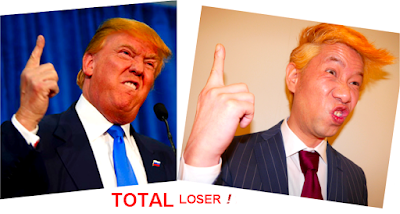"The United States seeks stability and the peaceful denuclearization of the Korean peninsula. We remain open to negotiations towards that goal."
-- (26 April 2017, Washington DC) US Secretary of State, Defense Secretary & Director of National Intelligence joint statement
This above stance may be a major change in US posture, and surely is of huge interest to China and to US allies Japan and South Korea.
US Armed Forces typically do not confirm or deny the presence of nuclear arms among the armaments of specific units or multi-service strike forces. US warships were effectively banned from nuclear-free New Zealand for 33 years until the destroyer USS Sampson was allowed to call in November 2016 for the NZ Navy's 75th anniversary celebrations.
Japan's "Three Non-Nuclear Principles" (not to manufacture, own, or allow entry of nuclear weapons into Japan: 非核三原則) are skirted by mutual pragmatism, with America refusing to acknowledge the presence of nuclear weapons on US ships, bombers or submarines on military business in Japan (link).
"Secret Agreements" allowing ambiguity have been (partly) revealed in Tokyo, but the dynamic interaction of the US government with client-states Japan & South Korea remains obscure.
These officially are not occupied nations. But the USA has built huge forward bases, and garrisons tens of thousands of troops throughout these territories. South Korea's now comprehensively disgraced former President controversially collaborated with American military strategists to deploy THAAD missiles & associated radar systems in Korea (deployment vigorously denounced by China, which organized painful consumer & tourism boycotts of South Korea). One Japanese report claims the AN/TPY-2 radar can see a baseball 790km away, and an oil drum 2300km distant; such range covers much of China, perhaps limited by curvature of the earth. Whatever the case, THAAD only just arrived in Korea this week, and requires time for local delivery & setup.
Understanding of what's happening should recognize the critical Korean presidential election is only days away. Meanwhile, Japan's Prime Minister is just now in Moscow -- What's America doing to protect it's vital interests?
Yokosuka, Japan, is home port to the mighty American aircraft carrier USS Ronald Reagan (CVN-76). Other potential nuclear-armed submarines, ships, and units are scattered throughout the region, perhaps including CNFK operations recently relocated to Jinhae near Busan, Korea (CFAC, 진해함대지원부대). These forces are of major concern to Russia, China, and the people of Northeast Asia.
Is America seriously considering any form of regional denuclearization?
The USA has thus far blatantly (link) refused to participate in United Nations discussions on the Legally Binding Instrument to Prohibit Nuclear Weapons, Leading Towards their Total Elimination. Will the USA now pledge to potentially create nuclear-free regions?
Those troubled by America's nuclear weaponry will most likely analyze yesterday's joint statement with reaffirmed understanding that Yankee is a lyin' sack of shit.
 |
| 강경에는... 초강경으로! Hard ... SUPER HARD! |






























